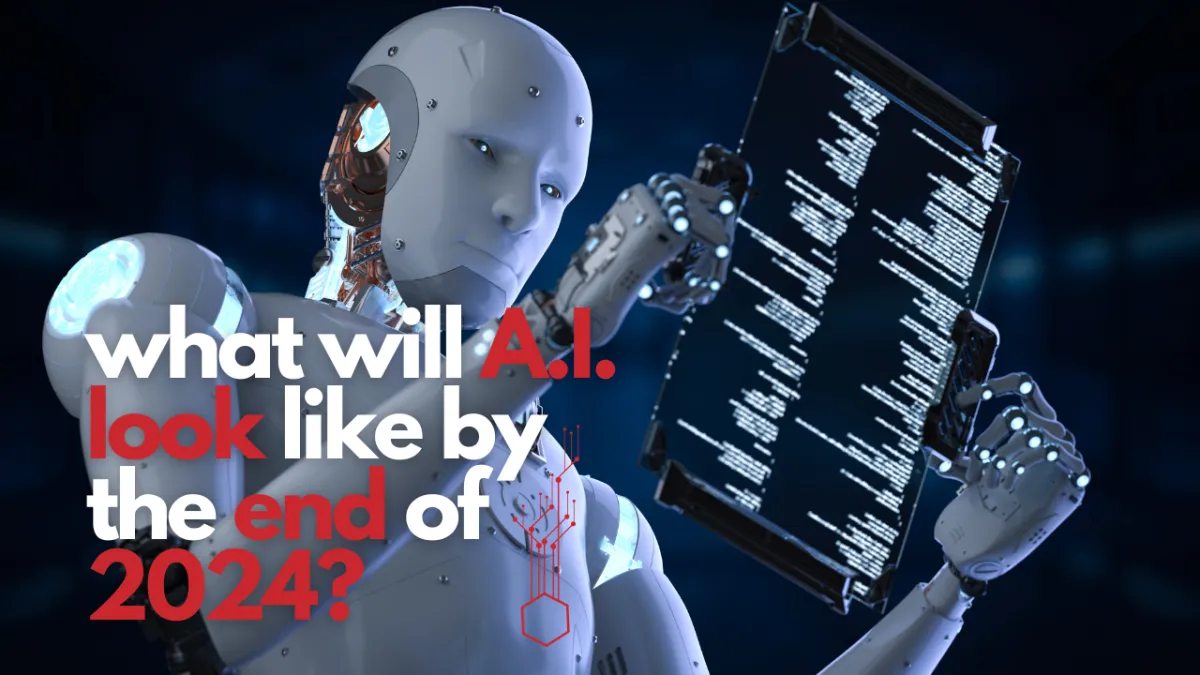LATEST
NEWS

What A.I. has in Store for Us in 2024
Since the birth of artificial intelligence in the tech industry, it has become essential to re-evaluate one’s practices, anticipate the major transformations to come and estimate their impact. In this respect, experts have developed predictions on the scope of AI in relation to cybersecurity in 2024.
The Rise Of Ai In Cyber Attacks And Defense
Cybercriminals will increasingly rely on artificial intelligence to perfect their attacks, while businesses and organizations will strengthen their coverage with AI-based responses to detect and counter these threats. This arms race between defense and offense will certainly stimulate innovation, leading to more advanced solutions. AI can also be used to enhance corporate security by automating compliance processes and improving access to privileges and reporting. By embracing AI, organizations can better protect themselves in an ever-changing IT landscape.
The Evolution Of Ai Security And Deterrence Posture Testing
Posture testing will become more widespread to identify and mitigate specific AI vulnerabilities, such as pattern manipulation or rapid injection attacks. The AI Red Team, specialized in offensive security testing, will continue to recruit diverse teams for in-depth assessments of AI systems, with an emphasis on empathy and detailed verification scenarios. Its collaboration with Bug Bounty programs will play a critical role in securing AI infrastructures against sophisticated threats, reflecting a proactive and comprehensive approach.
The Rise Of Targeted Ransomware And Social Engineering Attacks
Ransomware and social engineering will become more rigorous and sophisticated threats, targeting large businesses, critical infrastructure and governments. AI capabilities, including linguistic models such as ChatGPT and LLaMA, will help cybercriminals design thoughtful social engineering attacks. The growing integration of AI systems with personal social media data will enable even low-level criminals to create targeted and compelling campaigns.
The Rampant Growth In Synthetic Media And Misinformation
Although deepfakes, or synthetic media, can be used for entertainment purposes, they also pose serious problems in terms of information manipulation and security. Such content is often doctored to make people appear in situations or actions that never occurred, in order to spread fake news, rig elections, defame public figures… Bad actors will be able to create AI-generated versions of these to legitimize the fake news. In return, businesses will need to adopt a managed AI policy to reduce risk, including team education, clear working practices, monitoring of AI tool use and regular updates to security protocols.
The MicroAge network provides IT services and solutions for companies of all sizes to leverage and maximize their technology investments to meet their business needs. Let us help you!

What A.I. has in Store for Us in 2024
Since the birth of artificial intelligence in the tech industry, it has become essential to re-evaluate one’s practices, anticipate the major transformations to come and estimate their impact. In this respect, experts have developed predictions on the scope of AI in relation to cybersecurity in 2024.
The Rise Of Ai In Cyber Attacks And Defense
Cybercriminals will increasingly rely on artificial intelligence to perfect their attacks, while businesses and organizations will strengthen their coverage with AI-based responses to detect and counter these threats. This arms race between defense and offense will certainly stimulate innovation, leading to more advanced solutions. AI can also be used to enhance corporate security by automating compliance processes and improving access to privileges and reporting. By embracing AI, organizations can better protect themselves in an ever-changing IT landscape.
The Evolution Of Ai Security And Deterrence Posture Testing
Posture testing will become more widespread to identify and mitigate specific AI vulnerabilities, such as pattern manipulation or rapid injection attacks. The AI Red Team, specialized in offensive security testing, will continue to recruit diverse teams for in-depth assessments of AI systems, with an emphasis on empathy and detailed verification scenarios. Its collaboration with Bug Bounty programs will play a critical role in securing AI infrastructures against sophisticated threats, reflecting a proactive and comprehensive approach.
The Rise Of Targeted Ransomware And Social Engineering Attacks
Ransomware and social engineering will become more rigorous and sophisticated threats, targeting large businesses, critical infrastructure and governments. AI capabilities, including linguistic models such as ChatGPT and LLaMA, will help cybercriminals design thoughtful social engineering attacks. The growing integration of AI systems with personal social media data will enable even low-level criminals to create targeted and compelling campaigns.
The Rampant Growth In Synthetic Media And Misinformation
Although deepfakes, or synthetic media, can be used for entertainment purposes, they also pose serious problems in terms of information manipulation and security. Such content is often doctored to make people appear in situations or actions that never occurred, in order to spread fake news, rig elections, defame public figures… Bad actors will be able to create AI-generated versions of these to legitimize the fake news. In return, businesses will need to adopt a managed AI policy to reduce risk, including team education, clear working practices, monitoring of AI tool use and regular updates to security protocols.
The MicroAge network provides IT services and solutions for companies of all sizes to leverage and maximize their technology investments to meet their business needs. Let us help you!
Get the most from your IT
As service providers to more than 300 companies, the dedicated professionals at MicroAge are second to none when it comes to managed services. By improving efficiency, cutting costs and reducing downtime, we can help you achieve your business goals!
Blog post categories
Contact Us
CHILLIWACK
As service providers to more than 300 companies, the dedicated professionals at MicroAge are second to none when it comes to managed services. By improving efficiency, cutting costs and reducing downtime, we can help you achieve your business goals!
1-844-773-5753
#203 - 46167 Yale Rd, Chilliwack, BC Canada V2P 2P2
Monday - Friday, 8:00 am - 5:00 pm

Contact Us
1-844-773-6788
#200 - 45896 Alexander Ave, Chilliwack, BC, Canada V2P 1L5
Monday - Friday, 8:00 am - 5:00 pm
© Copyright 2023. MicroAge Chilliwack. All rights reserved.